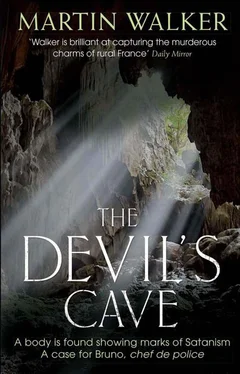Martin Walker - The Devil's Cave
Здесь есть возможность читать онлайн «Martin Walker - The Devil's Cave» весь текст электронной книги совершенно бесплатно (целиком полную версию без сокращений). В некоторых случаях можно слушать аудио, скачать через торрент в формате fb2 и присутствует краткое содержание. Год выпуска: 0101, Издательство: Quercus, Жанр: Полицейский детектив, на английском языке. Описание произведения, (предисловие) а так же отзывы посетителей доступны на портале библиотеки ЛибКат.
- Название:The Devil's Cave
- Автор:
- Издательство:Quercus
- Жанр:
- Год:0101
- ISBN:нет данных
- Рейтинг книги:4 / 5. Голосов: 1
-
Избранное:Добавить в избранное
- Отзывы:
-
Ваша оценка:
- 80
- 1
- 2
- 3
- 4
- 5
The Devil's Cave: краткое содержание, описание и аннотация
Предлагаем к чтению аннотацию, описание, краткое содержание или предисловие (зависит от того, что написал сам автор книги «The Devil's Cave»). Если вы не нашли необходимую информацию о книге — напишите в комментариях, мы постараемся отыскать её.
The Devil's Cave — читать онлайн бесплатно полную книгу (весь текст) целиком
Ниже представлен текст книги, разбитый по страницам. Система сохранения места последней прочитанной страницы, позволяет с удобством читать онлайн бесплатно книгу «The Devil's Cave», без необходимости каждый раз заново искать на чём Вы остановились. Поставьте закладку, и сможете в любой момент перейти на страницу, на которой закончили чтение.
Интервал:
Закладка:
‘That’ll do,’ he said, and pulled a small wooden board and some limes from his bag and took his Laguiole knife from his belt. ‘You keep paddling, Bruno, and we’ll have our cassecroute before you know it.’
Bruno kept glancing back to watch Antoine gut the fish and put the slim fillets he had carved into a plastic bag. Then he halved the limes and squeezed their juice into the bag until there was enough to cover the white flesh. He re-baited his hooks and continued to paddle.
By the time they reached the church of St Leon-sur-Vezere after the first of the long bends, the sun was climbing steadily and Bruno had taken off his shirt. They had looked at three more locked boathouses and some rickety landing-stages with so much moss on them it was plain they had not been used since the previous year. There were two possible sites where the punt could have gone into the river, and Bruno had marked them on his map. Each was a place where canoes were rented out in the summer, and Antoine knew the boatmen and promised to call them and check.
Just after St Leon the river divided into different channels as it ran between sandbanks covered with pebbles. Antoine beached the canoe on one of these and opened the wine. Bruno halved the baguette as Antoine opened the plastic bag and shared out the strips of fish soaked in lime juice. Bruno relished the sensation, tart but fresh, tasting a thousand times better here on the river with the sounds of water lapping over the shallows.
‘My favourite casse-croute ,’ said Antoine. ‘And with any luck we’ll fry up fresh trout for lunch. There’s a place I know just downstream by the old monastery that teems with fish. My dad used to tell me it was centuries of the monks’ latrines seeping into the river.’
‘Now you tell me,’ Bruno replied, grinning.
They pushed off and paddled further into the familiar landscape of limestone cliffs and caves. The cliffs towered above them and the erosion of the river over centuries had carved deep overhangs so that the stone loomed overhead as if ready to topple down upon them. The trees were thick on the inner bank, and without the heat of the sun Bruno shivered in the sudden chill, made all the more eerie by the way the skirls of mist rose from the water.
Up to his right Bruno now saw emerging high on a cliff a regular formation of stone that looked like the battlements of some giant’s castle. Beneath them ranged a series of cave entrances and then what looked like a gallery carved deep into the rock, the interior lost in shadows.
‘This is where they always bite,’ Antoine’s voice broke in. ‘That’s the old monastery up there and the hermits’ cells. Over on the other side you can just see the towers of Chateau Marzac above the lower ridge …’ He paused. ‘Got one.’
He pulled in his line to reveal two wriggling trout, each about twenty centimetres long. He detached the hooks and put them in his catch net and dropped it back over the side of the canoe. No sooner had he re-baited his hooks and put the line back into the water than he caught another, and a fourth bit as he began to haul the line back in.
‘Told you this was a good spot,’ he said.
They came to a stretch where the river widened and the sun shone down over a low pebbled island in the middle of the stream. Antoine steered the canoe under some low-hanging boughs that made Bruno duck. Then they were in a small and hidden lagoon with a tiny pebble beach and beside it a tumbledown wooden boathouse.
‘ Tiens ,’ said Antoine. ‘The river’s broken through.’ He pointed with his paddle to a spot beneath overhanging trees where Bruno could see the flow of the main river coming into the lagoon. He took them close to the point where the river gushed in, less than a metre wide, but he and Bruno had to paddle to hold the canoe steady against the strong current.
‘How would the river have done that?’ Bruno asked.
‘ Ecrevisses ,’ said Antoine. Crayfish, small freshwater crustaceans that looked like miniature lobsters and tasted even better, had probably nibbled and nibbled away at some long-sunken log that held the dam together even as the river scoured and eroded it from the other side. Then came a strong rain, a flood surge in the river and the dam gave way.
‘So if she committed suicide here, she could have expected that her boat would remain inside the lagoon,’ Bruno suggested. ‘She wasn’t to know it was no longer a lagoon, and the new current carried her out to the main stream. Could it have happened like that?’
‘Maybe,’ Antoine replied, ‘but only if she wanted to keep her death secret. Remember the toubib ’s theory? Gelletreau said she might have wanted the world to see her body, to make a big display.’
Antoine let the current take them back into the middle of the tree-fringed lagoon and steered them to the small beach where they landed and walked up to the old boathouse. There was no padlock on the door, just a simple wooden latch. Inside was the wreck of an old sailboat, big enough for an adult and a child, its mast worm-eaten. To one side was a space with smears in the dust. Old clothes hung on hooks on the wall alongside loops of ropes of different sizes. He touched some of the hanging clothes and dust rose, except for one dark garment. He took it from the hook and held it up. It was a robe of some kind with a hood, of coarse wool. It carried a faint scent of something, possibly perfume, possibly the merest hint of woodsmoke. The aroma was elusive, disappearing before Bruno could begin to identify it. But at least it had been used fairly recently.
‘I’d say that it was a punt that lay here,’ said Antoine, gesturing at the gap beside the crumbling sailboat. He pointed up to the sagging rafters where two long poles lay across the beams. ‘Those are punt poles.’
They went outside and looked at the scrape marks from the doors to the water. The earth around them was scuffed, but that could have been the usual markings of ducks, voles and water rats that used the riverbanks.
‘A punt could have been launched here, and one was certainly kept there,’ said Antoine. ‘You may have found your spot.’
The boathouse was part of the land that belonged to the Red Chateau, Antoine explained, so named because of the owner, the Red Countess. The name rang a very distant bell with Bruno.
‘You’re too young to remember,’ Antoine said. ‘But she was famous in her day, an aristocrat in the Communist Party. She was always in the papers, leading demonstrations, making speeches. But the Red Countess was also a celebrity, Cannes film festival and the races at Longchamps, all that sort of thing. Yves Montand was a boyfriend, and Camus before he killed himself. And Malraux, of course.’
The Red Countess, thought Bruno. It was one of those names you knew you ought to know, from an era just before his own. Somehow it sparked memories of newsreels he’d seen of another, much older France in the 1950s: Jean-Paul Sartre and a huge Communist Party, Piaf at the Olympia and Jacques Brel and smoky nightclubs on the Left Bank. But the name triggered other associations: the Chant des Partisans and the parade of the heroes of the Resistance at the Arc de Triomphe each year on 18 June, the anniversary of the day de Gaulle had launched the Resistance over the radio from London. He asked if there was a connection, and Antoine nodded.
‘She was a courier for the Resistance round here when she was a kid, an upper-class teenage girl on a bike. She always got through the roadblocks. She got medals for it, after the war.’
‘She was born here?’ Bruno asked. He’d been in St Denis for more than ten years but there was still a lot of the local history that he didn’t know.
‘It’s the family estate and it’s where she grew up. She used to come from time to time but I haven’t heard anything about her for years. My uncle worked for her as a gardener, worshipped her. I even met her once when she came to see my uncle in his shed, sometime in the late Fifties. I’d have been eight, maybe nine. She was a stunner. I’ve still got the book she gave me, about King Arthur and his knights of the round table.’ He paused and laughed. ‘I kept imagining her in it, you know how kids do.’
Читать дальшеИнтервал:
Закладка:
Похожие книги на «The Devil's Cave»
Представляем Вашему вниманию похожие книги на «The Devil's Cave» списком для выбора. Мы отобрали схожую по названию и смыслу литературу в надежде предоставить читателям больше вариантов отыскать новые, интересные, ещё непрочитанные произведения.
Обсуждение, отзывы о книге «The Devil's Cave» и просто собственные мнения читателей. Оставьте ваши комментарии, напишите, что Вы думаете о произведении, его смысле или главных героях. Укажите что конкретно понравилось, а что нет, и почему Вы так считаете.












